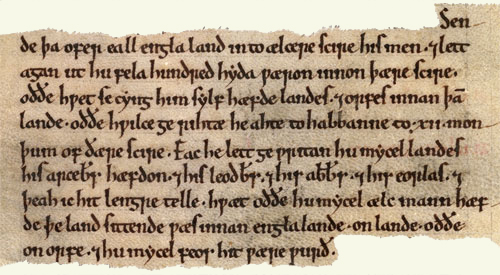
From
the First Booke of Faerie Queene
contayning
The
Legende of the
Knight
of the Red Crosse
or
Of
Holinesse
Published
by Edmund Spenser
First
Edition: 1915
. . Of Saxon Kings, that have with mightie hand
. . And many bloudie battailes fought in place
. . High reard their royall throne in Britane land,
. . And vanquisht them, unable to withstand:
. . From thence a Faerie thee unweeting reft,
. . There as thou slepst in tender swadling band,
. . And her base Elfin brood there for thee left.
Such men do Chaungelings call, so chaungd by Faeries theft.
And
from the Anglo-Saxon Chronicle:
Translated
by the Rev. James Ingram
First
Published: 1823
.
. A.D. 1069. This year died Aldred, Archbishop of York; and he
is there buried, at his see. He died on the day of Protus and Hyacinthus,
having held the see with much dignity ten years wanting only fifteen weeks.
Soon after this came from Denmark three of the sons of King Sweyne with
two hundred and forty ships, together with Earl Eborn and Earl Turkill,
into the Humber; where they were met
by the child Edgar, the Earl Waltheof, and Merle-Sweyne, and Earl Gospatric with the Northumbrians, and all the landsmen; riding and marching full merrily with an immense army: and so all unanimously advanced to York; where they stormed and demolished the castle, and won innumerable treasures therein; slew there many hundreds of Frenchmen, and led many with them to the ships: but, ere that the ship-men came thither, the Frenchmen had burned the city, and also the holy minister of St. Peter had they entirely plundered, and destroyed with fire. When the king heard this, then went he northward with all the force that he could collect,
despoiling and laying waste the shire withal; whilst the fleet lay all the winter in the Humber, where the king could not come at them. The king was in York on Christmas Day, and so all the winter on land, and came to Winchester at Easter. Bishop Egelric, was at Peterborough, was this year betrayed, and led to Westminster; and his brother Englewine was outlawed. This year also died Brand, Abbot of Peterborough, on the fifth before the calends of December.
by the child Edgar, the Earl Waltheof, and Merle-Sweyne, and Earl Gospatric with the Northumbrians, and all the landsmen; riding and marching full merrily with an immense army: and so all unanimously advanced to York; where they stormed and demolished the castle, and won innumerable treasures therein; slew there many hundreds of Frenchmen, and led many with them to the ships: but, ere that the ship-men came thither, the Frenchmen had burned the city, and also the holy minister of St. Peter had they entirely plundered, and destroyed with fire. When the king heard this, then went he northward with all the force that he could collect,
despoiling and laying waste the shire withal; whilst the fleet lay all the winter in the Humber, where the king could not come at them. The king was in York on Christmas Day, and so all the winter on land, and came to Winchester at Easter. Bishop Egelric, was at Peterborough, was this year betrayed, and led to Westminster; and his brother Englewine was outlawed. This year also died Brand, Abbot of Peterborough, on the fifth before the calends of December.

